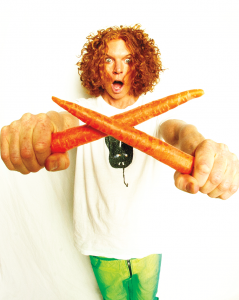He Who Laughs Last
Funnyman Scott “Carrot Top” Thompson talks about his Florida roots, impressive career longevity, and the importance of comedy
 For comedian Scott Thompson—better known to the world as Carrot Top—the road from his humble beginnings in Rockledge, Florida, to a decade-plus residency at Las Vegas’ Luxor Hotel was as long and strange as they come. Thompson’s persistence and signature mix of prop and observational comedy have served him well through the years, despite frequent mocking by peers along the way, resulting in not just the long-running Vegas gig but also countless film and television roles, numerous celebrity friends, and a dedicated legion of fans.
For comedian Scott Thompson—better known to the world as Carrot Top—the road from his humble beginnings in Rockledge, Florida, to a decade-plus residency at Las Vegas’ Luxor Hotel was as long and strange as they come. Thompson’s persistence and signature mix of prop and observational comedy have served him well through the years, despite frequent mocking by peers along the way, resulting in not just the long-running Vegas gig but also countless film and television roles, numerous celebrity friends, and a dedicated legion of fans.
With Thompson set to return to Orlando for a show at The Plaza Live on March 21, we were thrilled to chat with him about his origins, his career, and his advice for anyone else thinking of getting into comedy.
ORLANDO FAMILY MAGAZINE: We understand that you own a home in Winter Park. How much time do you spend down here, and what are some of your favorite things to do while you’re in town?
SCOTT THOMPSON: I get like eight weeks a year maybe. It’s funny—I stay right here on Park Avenue most of the time. People always say, “Are you going to Disney or Doctor Phillips or whatever?” And I go, “No, not if I have to get on I-4.” I have a little Vespa scooter. Anywhere I can go on that is where I normally go. I just sort of cruise around.
OFM: You’re also one of Central Florida’s most famous natives, being born in Rockledge, raised in Cocoa and attending Florida Atlantic University (FAU). What did you like most about growing up here?
ST: Everything in general. I like that we have beaches, I don’t mind the warm climate … and a lot of my family lives down here. You can get pretty much anywhere from [Orlando International Airport], so it’s convenient in that regard. I’ve always been a big fan of Florida.
I think I had a good time growing up here. I went to school in Boca [Raton], and I used to go to school, and then I’d go surfing, and then I’d go back to school. Not many people go to a college that’s right next to a beach.
OFM: You performed your first standup gig while going to FAU. How did that come about?
ST: There was [a small club] with a stage, and they had a guy up there one night doing something—I think he was just playing guitar, maybe? I said to the [owner], “Do you have comedy in here?” He said, “No, do you know anybody who can do it?” And I said, “I was thinking of doing it.” He said, “Any night you want to go up there and do it, do it.” So, I put flyers out around the school and I had a little Carrot Top night. And that was the first time that I actually came up with the name Carrot Top. I had the idea of a name and a logo. I even drew the logo out, and I still have it framed—I drew it with a Sharpie. It was like a little stick figure holding a microphone.
So, I went out and did my little skit, and about 20 to 30 people came out. It went really well, and I was told, “Any night you want to do it [when the stage is] free, you can use it.” I would do that pretty regularly and try to come up with new stuff each week.
From there, I ventured out into the actual club scene, but that’s where I started, right there on FAU campus. In fact, I went back there not long ago and walked right back into the same room, and it’s still there, the same exact room, same carpeting—they haven’t changed a thing.
OFM: What was it like when your career started to take off?
ST: It was crazy. I remember I was on the beach … having lunch, and it was the first time somebody recognized me. I remember thinking, that’s weird. From then on, it became sort of a normal kind of thing, but progressively more and more people recognize you. … I would never say I was famous; I would say I was recognizable in a lineup. I’m one of those people—people would always just stare at me, like, “Look at that guy.” I always had kind of a bigger-than-life presence.
OFM: In what ways has your show evolved over the years, from your first performance in Florida to your current tours and Las Vegas residency?
ST: I’ve evolved more with production values than just joke-telling. When I first started standup, it would just be me and my little box of stuff. As the years went on, I started doing bigger things and colleges and what not. The box grew, and I got more stuff. When I first played Vegas, the showroom was so enormous and I felt so small on the stage with my little trunks, so I went out and got all these tables and lamps and tapestries and stuff and kind of made a little set so the stage had more stuff on it. So, it kind of became a little playground.
As time went on, I kept on adding to it: First I had lights, then strobe lights and then fog machines—the production value of the show really evolved. At one point, we even had pyro, believe it or not, for years back in the day. When I played colleges, people would say, “I saw Carrot Top; he had pyrotechnics!” It worked.
The latest thing in the past 10 years is that I have this huge video wall behind me… I can talk about Trump, and behind me is a picture of Trump, and some other joke involving whatever the topic might be. That’s another thing that’s helped the show evolve—there are so many different ways you can get a joke across instead of just telling it.
OFM: Who are some of the comedians or actors that inspired you to go into comedy?
ST: Every style of comedy, there’s great material. You can watch Louis C.K., you can watch anybody, and they’re all different. It’s what I like about music, too; you can listen to any kind of band, and they’re all going to have a different sound, look and tempo. But George Carlin was probably one of my favorites when I was growing up—not really emulating his style, because my style isn’t even close to Carlin’s as far as the writing. I do some observational stuff, which he was brilliant at, but my style isn’t really his. I don’t know if there’s anyone who’s really tried to emulate him style-wise.
I still do a little gesture [that makes people say], “That’s funny, you do a pretty good Johnny Carson.” Johnny Carson always had this little thing he would do when a joke wasn’t working—it was just a thing he did.
Actors, of course, there’s been a ton. I remember when I was a kid, I wanted to be Burt Reynolds so bad. He [lives] down in Florida, and when I lived down there in Boca, I used to drive up to Jupiter where his house was, and I would just sort of drive around and go, “Yeah, Burt Reynolds lives right in there!” I used to always think, maybe I’ll see him out a restaurant or something. I did get to meet him at some event in Las Vegas, and I was on The Tonight Show with him. I told him that, too. I said: “I used to want to be you when I was a kid. I even drew a black mustache on me with a Sharpie.” And he’s like, “Oh, great.” And I said, “No, I really did.”
OFM: On a related note, which current comedians make you laugh the most?
ST: I think Jimmy Fallon does such a great job [on The Tonight Show]—I come home from work and I watch him. And I like James Corden [of The Late Late Show with James Corden]. I like all these new talk-show guys. One, they’re all comics, too. Of course, Jay [Leno] was always a comic, and [David] Letterman was a comic, so most talk-show hosts were comics. I watch them just to make sure I’m doing the right stuff and staying on top of the topics.
OFM: You’ve been a headliner at Vegas’ Luxor for more than a decade, and it seems you’ve developed pretty good relationships with other Vegas and musical icons, such as Penn & Teller, Gene Simmons and others. Keeping in mind that we’re a family magazine, what have been some of your most memorable Sin City experiences to date?
ST: The one that I remember the most, that just floored me … is the drummer from Queen came [to my show]. Roger Taylor. I remember thinking, no. They always tell me who’s coming, and they said Roger Taylor’s going to be in your seats tonight. And I was like, “Roger Taylor. Queen? … The drummer from Queen is coming?” … I have every Queen album, and I think I even had a documentary, and then he came to the show. It was the most coolest, iconic guy just standing in my dressing room talking to me. … That was pretty cool, and then I wound up becoming friends with him and got to hang out in London with him; stuff like that. So, that’s probably my favorite cool thing that’s happened.
OFM: A lot of comedians have taken shots at you over the years for being a “prop comic,” so it must have been pretty satisfying to see so many detractors fall off the comedy map during your 30-plus-year career. In what ways did those criticisms either inhibit or inspire you when you first started to make a name for yourself?
ST: I think now I don’t even think about—it doesn’t go in my brain. But in my impressionable days, it did hurt. “How come Dennis Miller doesn’t like me? How come he’s making fun of me?” But one day, it just hit me: You know, I’ve been doing this [stuff] for 30 years. Why are they making fun of just me? … They still do, every once in a while, but people don’t take shots at me as much. Probably because [they’ve realized], “He’s in the club now; he’s been doing this 30 years.”
OFM: What do you think the secret is to having longevity in a business where people come and go so often?
ST: I wish I knew. It’s hard work—I really do work every day. I take breaks, but since I’ve been at the Luxor, I haven’t had more than a week off here and there. I haven’t taken two weeks off in 20 years. I don’t know what that’s like. I do work a lot, and I think I do work on the craft a lot. I do try to add something, even if it’s just one joke a night, or one thing a night, so it all adds up. Sometimes it’s two, sometimes it’s three jokes, it just depends on how my brain functions. That, and I’ve been very lucky to have fans who have wanted to come see it. That’s the part I wish I could figure out: how and why.
OFM: Any advice for up-and-coming comedians who might be reading this?
ST: Comedy is a fun thing, it’s a great job—I love it, and I was very lucky to get where I’ve gotten to go with it. … If they’re thinking about getting into comedy, the only advice I would give them is to find your voice. That is, find what it is that you want to be talking about when you’re up there. … But definitely give it a shot; it’s fun. The world needs more comics. We need more people laughing right now, so I would encourage anyone to get into it.
An abridged version of this article originally appeared in Orlando Family Magazine’s March 2017 issue.









